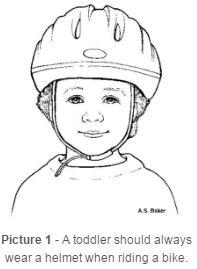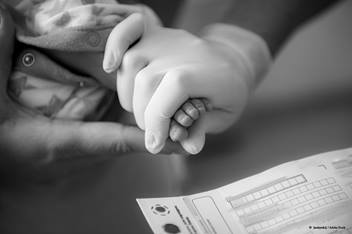Hemophilia
![]()
Hemophilia (he mo FEE lee ah) is an inherited blood disorder. In hemophilia, a blood clotting factor is missing. In Hemophilia A, Factor VIII (8) is missing. In Hemophilia B, Factor IX (9) is missing.
Without these factors, blood will not clot well. People with hemophilia are born with the disorder. You cannot catch it from someone else. It lasts all of your life and it will not go away. Hemophilia occurs mainly in males but females can carry the gene that causes it and may or may not have bleeding problems. Some children with hemophilia have no family history of the disorder. There is no cure for hemophilia at this time, but there is medicine people can take. This medicine helps them stop bleeding so they can do most of the things everyone else does. By using the medicine and visiting a hemophilia treatment center regularly, the person with hemophilia can expect to live a long and happy life.
Why People with Hemophilia Bleed
Some people think a person with hemophilia can bleed to death from a small cut.This is not true. Usually small cuts and scrapes stop bleeding just fine.
A person with hemophilia has problems when a fibrin clot is needed to stop the bleeding. People with hemophilia do not have enough of either clotting factor 8 or 9. Because of this, the fibrin clot is not made or is so thin that the bleeding goes on.
The person with hemophilia does not bleed faster than someone without hemophilia. However, the person with hemophilia will bleed longer.
Treatment
The key to best outcomes is to prevent and treat bleeding. You do this by making good choices of activities and wearing good safety equipment such as seat belts, bike helmets and sports safety gear. If your child has bleeding, he may be given Factor VIII (8), IX (9), IV (into a vein). Refer to Helping Hand HH-II-17, IV Therapy. For mucosal bleeding (mouth/nose) he might be given an antifibrinolytic medicine (Amicar/Lysteda). Refer to Helping Hand HH-V-258, Tranexamic Acid (Lysteda).
Your child may need one or more doses of the clotting factor. Your child will receive the factor in the clinic, the hospital or as part of a home treatment program. Where the treatment is done depends on the extent of the bleeding and its location. For some children the nurse coordinator can arrange a home treatment program.
Ways to Help Prevent Bleeding
Here are some things you can do to help prevent bleeding:

- Be sure to tell the doctor, dentist or nurse your child has hemophilia.
- Be sure immunizations are given under the skin (subcutaneous) instead of into a muscle (intramuscular) and are given with a smaller needle. The staff should apply pressure and ice to the injection site for 5 to 10 minutes after the shot is given. This prevents bleeding.
- Do not let your child get intramuscular (IM) injections (shots).
- Never let a doctor or dentist do any procedure that involves opening the skin until you have talked with the Hemophilia team
- People with bleeding disorders must talk to their doctor or nurse before taking medicine that can affect their platelets. These include aspirin, ibuprofen and naproxen. Always ask your hemophilia team before giving your child a medicine.
- A toddler should wear a bicycle helmet when riding a bike (Picture 1).
- Children with hemophilia should not play contact sports such as football, wrestling, boxing or hockey. If you have any questions about your child playing sports, be sure to talk with your hemophilia team.
Types of Bleeding and Treatment
Remember that a person with a bleeding disorder will not bleed faster than anyone else. However, the bleeding will last longer if not treated.
- Early treatment of bleeding is especially important for people with hemophilia. They should follow these good rules for early treatment:
- Take factor right away if you have an injury. This is especially important if a similar injury caused a bleed in the past.
- Take factor as soon as you think you are bleeding.
- Take factor as soon as you see or feel any signs of bleeding such as tingling, bubbling, warmth or swelling.
- If you are not sure you are bleeding, take factor anyway.
Head or Neck Bleeding
If your child has any of the following symptoms, he should see a doctor right away. These could be signs of bleeding inside the head:
- Headache with vomiting
- Severe headache
- Blurred vision
- Sleeping a lot
- Personality change or child's mood is different
- Seizures
A child who gives himself factor at home should immediately give himself one dose of factor after a head injury. Then he should see the doctor.
Abdominal Bleeding
If your child has any of these symptoms of abdominal bleeding, call the doctor:
- Severe abdominal (stomach) pain with no explained cause
- Severe back pain
- Blood in the urine or stool
Joint Bleeding
If your child has any of these complaints, he may have bleeding into a joint and will need clotting factor. Call the doctor right away.
- Tingling or "bubbling" feeling in a joint
- Stiffness and pain in a joint
- Swollen, tender, warm and painful joint
- Limited or painful movement of the joint
Soft Tissue or Muscle Bleeding
If your child has any of these signs of soft tissue or muscle bleeding, call the doctor:
- A raised bump
- Pain, swelling; area is warm to the touch
- Trouble using the injured area
Mouth Bleeding
If your child has bleeding from the lips, gums or tongue, apply pressure and ice packs. If the bleeding does not stop, call the hemophilia team. Do not let him eat or suck a pacifier. Continue to hold ice packs over the cut until your child has been treated or until bleeding has stopped.
Cuts and Scrapes
- Apply pressure over the cut for 5 to 10 minutes.
- If the bleeding does not stop in 10 minutes, your child probably needs clotting factor.
- If you think the cut needs stitches, take your child to the doctor.
Remember: Before your child gets stitches, he MUST be treated with clotting factor.
Daily Care
- Your child should wear a medical identification bracelet or necklace. You can get it through your treatment center or local hemophilia chapter. It states that your child has hemophilia so if an emergency occurs, the doctor will know.
- Regular tooth brushing, flossing and dental care are important. When he goes to the dentist, be sure to tell the dentist your child has hemophilia.
Giving Clotting Factor at Home
- You can learn how to give clotting factor at home. Talk to the Hemophilia team about this.
- As your child gets older and more mature, he can learn to give the factor to himself.
The Comprehensive Hemophilia Center
- When your child is diagnosed with hemophilia, you will meet with the Hemophilia Team (doctor, nurse, physical therapist, psychologist, genetic counselor and social worker) to talk about your child's care.
- Your child will have regular appointments at the Comprehensive Hemophilia Center. This clinic provides specialists in hematology, dentistry, orthopedic surgery, social work, clinical nursing, research nursing and physical therapy.
Phone Numbers for Emergencies
Contact the Comprehensive Hemophilia Center at (614) 722-3250 Monday through Friday, 8 a.m. to 5 p.m.
On weekends and holidays, call the Nationwide Children’s Hospital Operator at (614) 722-2000. Ask for the hematologist on call. The doctor will return your call and tell you what to do. If you are unable to reach the hematologist on call, take your child to the closest emergency room right away.
The longer you wait, the more severe the bleeding can become. Delay can increase the amount of damage and the length of treatment.
If you have any questions, be sure to call the Hemophilia Team.
HH-I-170 11/92, Revised 12/15 Copyright 1992-2010 Nationwide Children’s Hospital


